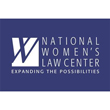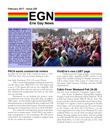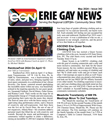NWLC Files Amicus Brief in Support of 16-year-old Male Trans Student Barred from Using Boys' Bathrooms at His Wisconsin High School
(Washington, D.C. - January 31, 2017) The National Women's Law Center (NWLC) and law firm Mayer Brown LLP submitted an amicus brief late afternoon yesterday in Whitaker v. Kenosha Unified School District that challenges the school district's decision to exclude 16-year-old transgender student Ash Whitaker from using boys' bathrooms at George Nelson Tremper High School. School administrators and teachers steadily monitored Whitaker to make sure he used the girls' restrooms and insisted on using only female pronouns and his birth name when addressing him.
The Center's brief argues that Title IX, the federal law that bans sex discrimination in education, prohibits schools from barring trans students from using the bathroom of their choice. The brief details how invented threats to women and girls in bathrooms have been used to perpetuate discrimination and undermine civil rights protections. Discrimination against trans people is rooted in sex stereotyping that federal law clearly forbids in schools.
"Ash Whitaker should be allowed to use the boys' bathrooms at his school," said NWLC Director of Education Neena Chaudhry. Trans students across the country have been ostracized and shamed for simply being themselves. It's time for schools to lead by example and fulfill their responsibility to create safe learning spaces, free of discrimination, for all students regardless of their gender."
In this case, filed by the Transgender Law Center and Relman, Dane & Colfax PLLC, the U.S. Court of Appeals for the Seventh Circuit will decide whether Title IX prohibits discrimination against transgender students. A similar case, G.G. v. Gloucester County School Board, will be heard by the Supreme Court in March.
The National Women's Law Center is a non-profit organization that has been working since 1972 to advance and protect women's equality and opportunity. The Center focuses on major policy areas of importance to women and their families including economic security, education, employment and health, with special attention given to the concerns of low-income women. For more information on the Center, visit: www.nwlc.org.



